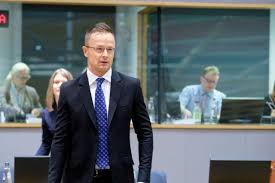EU ministers frustrated as Hungary blocks $7 billion in military aid for Ukraine

Brussels: Hungary’s chief of diplomacy received sharp criticism from his EU colleagues on May 27 over Budapest stalling 6.5 billion euros (around $7.1 billion) in military aid for Ukraine, Le Monde reported.
Hungary is blocking three separate 500-million-euro ($540 million) tranches under the European Peace Facility (EFF) fund, as well as 5 billion euros ($5.4 billion) allocated for the EFF’s Ukraine Assistance Fund.
Budapest approved the cash infusion for the Ukraine Assistance Fund in March, but it now refuses to sign off on documents needed to disburse the aid.
As European foreign ministers hoped to finalize the step during their meeting in Brussels on May 27, some criticized Hungary’s top diplomat, Peter Szijjarto, over Budapest’s opposition.
“The exchange was short but intense,” an undisclosed minister told Le Monde.
“I believe that the Hungarian minister understood the exasperation of his colleagues,” another source said.
“Tempers ran quite high,” a diplomatic source said, which reported that according to many officials, “the exchanges were among the most heated in years among EU foreign ministers.”
“Almost all of our discussions and needed solutions and decisions by (the) EU are being blocked by just one country,” Lithuanian Foreign Minister Gabrielius Landsbergis told reporters, adding that “about 41% of resolutions by (the) EU on Ukraine have been blocked by Hungary.”
EU foreign policy chief Josep Borrell said the delay “can be measured in terms of human lives.”
Several diplomats said that Hungary’s position is in line with Russia’s interests, while Hungarian leaders claim they merely advocate for peace.
The situation also prompted discussion among diplomats about how to shield the EU fund from Hungary’s veto, especially after the expected influx of around 3 billion euros from frozen Russian assets revenue, Bloomberg wrote.
Budapest has repeatedly opposed Ukraine’s accession to NATO and the EU, sanctions on Russia, undermined Western aid efforts for Ukraine, and maintained close relations with Moscow throughout the full-scale war.
Szijjarto told reporters on May 27 that Hungary faced “huge pressure” but maintained its position. Budapest’s agreement is necessary as the additional financing cannot be approved without unanimous support.





